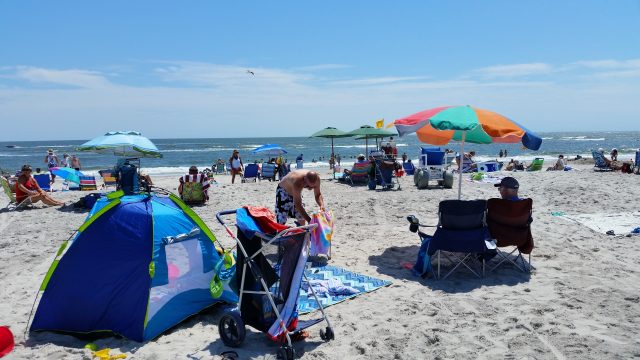By Donald Wittkowski
In its latest effort at curbing boorish behavior on the beach, Sea Isle City plans to have more police officers patrolling the sand next summer to cut down on drinking.
For the past two months, city officials have been debating ways to improve beach etiquette amid growing complaints about drinking and rowdiness.
At a City Council meeting Tuesday, Mayor Leonard Desiderio said there will be more police officers on the beach for the 2018 summer vacation season as part of a broader strategy to curtail bad behavior.
Desiderio’s pledge for a bigger police presence came in response to warnings from a local restaurant owner that Sea Isle could jeopardize its family-friendly image unless it takes action to clamp down on drinking and rowdiness.
“Let’s not make the beach the place to go to drink and party,” Mike Monichetti, owner of Mike’s Seafood & Dock Restaurant, told the mayor and City Council.
Monichetti said his restaurant customers have repeatedly complained to him about drinking, foul language and marijuana smoking on the beaches.
As he has done in recent weeks, Monichetti again urged city officials on Tuesday to hire more police officers to patrol the beaches during the peak summer tourism season.
“I don’t want to see us stumble,” Monichetti said. “We want people to come to Sea Isle. Sea Isle’s a great place.”
Desiderio and Councilman Frank Edwardi said the city intends to have more police patrols on the beaches for next summer.
“If it’s 10 more cops, or 15 more cops or whatever the number has to be, we have to do it,” Edwardi said.

Council President Mary Tighe assured Monichetti that city officials take his warnings seriously and will not ignore the problems.
“Just so you know, it hasn’t fallen on deaf ears,” Tighe said.
In particular, Monichetti said he was happy to hear of the plans for more police officers on the beaches.
During his remarks to Council, Monichetti expressed concerns that Sea Isle could develop the same reputation as Panama City Beach, Fla., or South Padre Island, Texas – two big spring break towns known for college partying – if word spreads on social media that drinking is rampant on the beaches.
“This is just going to snowball,” he said.

Drinking alcoholic beverages is already prohibited on Sea Isle’s beaches, but city officials concede that the law is often ignored.
Police officers already pose as regular beachgoers to try to catch people drinking. Police Chief Thomas D’Intino has requested city funding to buy more ATVs for additional beach patrols next summer.
In the past two months, City Council has discussed the possibility of passing new ordinances for stricter beach regulations, but has not yet taken that step. In the meantime, the city’s public relations office is preparing to print up thousands of pamphlet-size informational cards that will serve as friendly reminders for proper beach behavior.
Monichetti characterized the informational cards as a good start, but he doubted that they would be widely read by the young people who come to Sea Isle’s beaches to party.
Among other places, the cards will be available at the city’s Welcome Center on John F. Kennedy Boulevard. They will also be included in the welcome bags given to summer tourists when they check in at local real estate offices to pick up the keys for their vacation properties.
Many of the complaints by local residents about bad beach behavior have focused on a relatively new phenomenon called “tent-spreading.” Some beachgoers have been monopolizing prime spots near the water by spreading out large tents, canopies or cabanas on the sand.
During a public hearing in November, Council members and local residents discussed ways to prevent tents and canopies from dominating the beachfront and blocking the views of the ocean, including the possibility of imposing an outright ban.
Tighe, Edwardi and other Council members have said they are not in favor of a ban. Tighe, though, did raise the possibility of having tighter regulations on tents and cabanas. Some members of the public urged Council to restrict tents and cabanas to the back of the beach, near the dunes, so they won’t block the view of the ocean.
Tents and canopies are popular among parents to protect their children from sunburn and skin cancer. Earlier this year, Edwardi said tents are also a way to prevent aggressive seagulls from swooping down and snatching food.








